|
|
|
Sort Order |
|
|
|
Items / Page
|
|
|
|
|
|
|
| Srl | Item |
| 1 |
ID:
173912
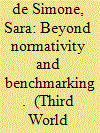

|
|
|
|
|
| Summary/Abstract |
The concept of human security became popular in the 1990s as a new framework for conceptualising security, shifting its referent from states to human beings and expanding its scope. While acknowledging the widespread criticism and rich debate that developed around the concept of human security after its appearance, this paper analyses the context in which human security emerged as a concept and reviews its different usages with a particular focus on its application to Africa and refugee-hosting areas. It maintains that the contribution of this concept goes beyond the simple statement that security is a matter of people’s lives. Thanks to its focus on subjective understandings of security, human security can be used as an analytical framework to produce context-specific knowledge about security based on people’s perceptions of what makes them secure/insecure and on local practices of human security – what people do to feel more secure. The application of a human security framework to refugee-hosting areas in Africa would contribute towards enhancing refugees’ agency in a context often dominated by a victimising narrative, as well as providing a comprehensive understanding of security priorities, providing important information for more context-specific policymaking.
|
|
|
|
|
|
|
|
|
|
|
|
|
|
|
|
| 2 |
ID:
160212
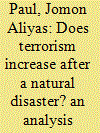

|
|
|
|
|
| Summary/Abstract |
Does an emergency such as a natural disaster lead to a surge of terrorism? This paper contributes to the emerging literature on this issue. We consider the experience of 129 countries during the period 1998–2012 to determine the effect of a natural disaster on both domestic as well as transnational terrorism. We also control for endogeneity using expenditure on health care and land area in a country as instruments. In contrast to the existing literature, we measure the extent of terrorism by the value of property damage. The results indicate that after natural disasters, (a) transnational terrorism increases with a lag, and (b) a statistically significant impact on domestic terrorism is not observed.
|
|
|
|
|
|
|
|
|
|
|
|
|
|
|
|
| 3 |
ID:
124546
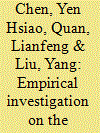

|
|
|
|
|
| Publication |
2013.
|
| Summary/Abstract |
This paper employs a structural time series model designed with three components of stochastic seasonality, trigonometric expression of cyclicality and local linear trend to investigate the evolutionary process of China's GDP. In particular, the model is able to detect the stop-go feature of China's economic growth, i.e., growth cycle, as well as business cycle. The empirical result suggests that most variation in China's macroeconomic performance came from business cycle. The investigation of the three components along with historical events suggests that the Chinese economy had been largely influenced by political activities up to the early 1990s. In the mid-1990s China entered a period of stable and highly growing economy, thanks to the economic reform and the successful implementation of macroeconomic policies. However, since the mid-2000s China has become more sensitive to the turbulences in international markets. In the foreseeable future, the challenge facing China is a more volatile economy with possible slowdown in the economic growth, although the growth rate would still be high compared to developed economies.
|
|
|
|
|
|
|
|
|
|
|
|
|
|
|
|
| 4 |
ID:
086451
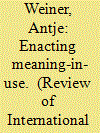

|
|
|
|
|
| Publication |
2009.
|
| Summary/Abstract |
This article proposes a framework for empirical research on contested meaning of norms in international politics. The goal is to identify a design for empirical research to examine associative connotations of norms that come to the fore when norms are contested in situations of governance beyond-the-state and especially in crises. If cultural practices shape experience and expectations, they need to be identified and made 'account-able' based on empirical research. To that end, the proposed qualitative approach centres on individually enacted meaning-in-use. The framework comprises norm-types, conditions of contestation, types of divergence and opposition-deriving as a specific interview evaluation technique. Section one situates the problem of contestation in the field of constructivist research on norms. Section two introduces distinctive conditions of contestation and types of norms. Section three details the methodology of conducting and evaluating interviews and presents the technique of opposition-deriving with a view to reconstructing the structure of meaning-in-use. Section four concludes with an outlook to follow-up research.
|
|
|
|
|
|
|
|
|
|
|
|
|
|
|
|
| 5 |
ID:
135243
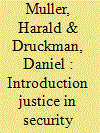

|
|
|
|
|
| Summary/Abstract |
This article provides an overview of this thematic issue. We discuss four issues about the role of justice claims in international relations (ir) scholarship: the discrepancy between the historical centrality of justice themes in political thought and empirical research in ir; challenges to the assumption of utility-maximizing motives; justice in the context of rules or norms of negotiation, and the rise of empirical research on justice in ir. We conclude with themes suggested by the contributing authors in this issue and suggest priorities for further research on justice in international negotiation.
|
|
|
|
|
|
|
|
|
|
|
|
|
|
|
|
| 6 |
ID:
114805
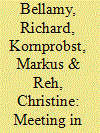

|
|
|
|
|
| Publication |
2012.
|
| Summary/Abstract |
Compromise is routinely evoked in everyday language and in scholarly debates across the social sciences. Yet, it has been subjected to relatively little systematic study. The introduction to this inter-disciplinary volume addresses the research gap in three steps. First, we offer three reasons for the study of compromise: its empirical omnipresence in politics, its theoretical potential to bridge the rationalist-constructivist divide, and its normative promise to recognize the plurality of society. Second, we introduce different approaches to the coherence, legitimacy and limits of compromise found in the existing explanatory and normative literatures. We discuss why these literatures need to speak to one another, and identify possible applications in empirical research. Third, we conceptualize compromise as one possible solution to a conflict. Distinct from both dissensus and consensus, all compromises share three characteristics: concessions, non-coercion and continued controversy. However, different types of compromise can be distinguished by how mutual, costly and painful concessions are; by whether all forms of coercion are absent; and by the degree to which the relevant parties' grounds for conflict are transformed. We conclude by discussing the challenge and appeal of 'politics as compromise' in plural and complex societies.
|
|
|
|
|
|
|
|
|
|
|
|
|
|
|
|
| 7 |
ID:
108235
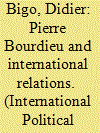

|
|
|
|
|
| Publication |
2011.
|
| Summary/Abstract |
This article demonstrates how the work of Pierre Bourdieu offers a productive way to practice research in international relations. It especially explores the alternatives opened by Bourdieu in terms of a logic of practice and practical sense that refuses an opposition between general theory and empirical research. Bourdieu's preference for a relational approach, which destabilizes the different versions of the opposition between structure and agency, avoids some of the traps commonly found in political science in general and theorizations of international relations in particular: essentialization and ahistoricism; a false dualism between constructivism and empirical research; and an absolute opposition between the collective and the individual. The "thinking tools" of field and habitus, which are both collective and individualized, are examined in order to see how they resist such traps. The article also engages with the question of whether the international itself challenges some of Bourdieu's assumptions, especially when some authors identify a global field of power while others deny that such a field of power could be different from a system of different national fields of power. In this context, the analysis of transversal fields of power must be untied from state centrism in order to discuss the social transformations of power relations in ways that do not oppose a global/international level to a series of national and subnational levels.
|
|
|
|
|
|
|
|
|
|
|
|
|
|
|
|
|
|
|
|
|